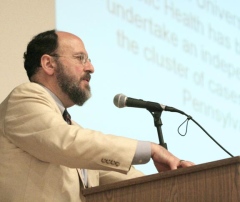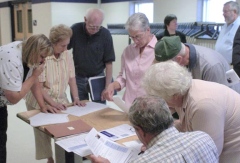2009.07.10 – Officials: Test for genetic marker needed
http://www.standardspeaker.com/news/officials_test_for_genetic_marker_needed
Officials: Test for genetic marker needed
BY MIA LIGHT (STAFF WRITER)
Published: July 10, 2009
Left, Dr. Arthur Frank of Drexel University talks Thursday evening at Tamaqua Area High School about the epidemiological study of polycythemia vera that will be conducted by the university. Right, area residents pick up information about polycythemia vera before the meeting about the disease.
As a scientific investigation gets underway into the cause of a high incidence of a rare blood disorder in the Schuylkill-Carbon-Luzerne county area, researchers need something from the people who live there – blood.
A team of medical researchers and specialists representing Drexel University of Philadelphia, the federal Agency for Toxic Substances and Disease Registry (ATSDR), the state Department of Health and Department of Environmental Protection delivered an update Thursday on the ongoing research into the cause and origin of a cluster of polycythemia vera (PV) along the Route 309 corridor from Hazleton to Tamaqua.
The preliminary study also identified a lesser, but statistically significant, number of PV cases from Frackville to St. Clair in Schuylkill County.
As the research enters high gear, ATSDR toxicologist Ken Orloff announced that cost-free blood tests will be offered to all residents of the Schuylkill-Carbon-Luzerne County area.
Results of the blood tests will not only assist medical science in tracking down the cause of PV, it will let the blood donor know whether they possess a harborer of PV.
Drexel University researcher, Dr. Arthur Frank, said preliminary research has discovered a mutation of a gene – a genetic marker called JAK 2 – which is present about 95-percent of people who are diagnosed with PV. The discovery indicates a possibility that people with this mutated gene may develop PV later in life. Frank said it is important to note that the mutation is not hereditary; it is caused by some other source. Identifying the source could help pinpoint the cause of PV.
Because the cause of PV is yet unknown and an environmental source remains a possibility, residents of Schuylkill, Carbon and Luzerne counties that are not directly within the cluster area are equally urged to participate in the blood test since negative JAK 2 blood samples will help researchers compile a case control study.
Blood testing opportunities will be available at St. Jerome’s Church, Tamaqua, the Schuylkill Mall, Frackville, and at Hazleton General Hospital. Testing will be held Aug. 3 through 6 and Aug. 10 through 13 from 9 a.m. to 5 p.m.
Call toll-free 1-877-525-4860 to schedule an appointment. The procedure takes about 15 minutes. A small blood sample will be collected and tested for the JAK 2 genetic marker. The test is free and results can be mailed to the participant in about 4 to 6 weeks.
While people age 40 and older are particularly urged to participate in the blood screening because the disease can takes years to develop, there are no age restrictions. People of all ages are encouraged to participate.
You must be a resident of Schuylkill, Carbon or Luzerne County for at least the past year.
“The benefit of having the test done is knowing whether you carry the JAK 2 genetic marker,” ATSDR Toxicologist Vince Seaman said.
Early detection of PV, before clinical symptoms appear, could lead to medical care that prevents or delays complications of the disease.
“If I lived here, I would get tested,” Seamon said.
The PV cluster was confirmed by the ATSDR and Center for Disease Control in 2008 after residents in an area surrounding Ben Titus Road, off Route 309 in Rush Township between Tamaqua and McAdoo, started complaining of an unusually high number of cancer cases and other illnesses in 2005.
Earlier this year, U.S. Sen. Arlen Specter announced the award of $5.5 million for a comprehensive study into the cause and origin of the disease.
Dr. Ken Orloff of ATSDR referred to the Schuylkill-Carbon-Luzerne County cluster area as a “hot spot.”
“Its already been identified as a hot spot, for reasons we don’t yet know,” Orloff said.
For more information on the screening or PV, contact Orloff at ATSDR at 1-866-448-0242.
mlight@standardspeaker.com


